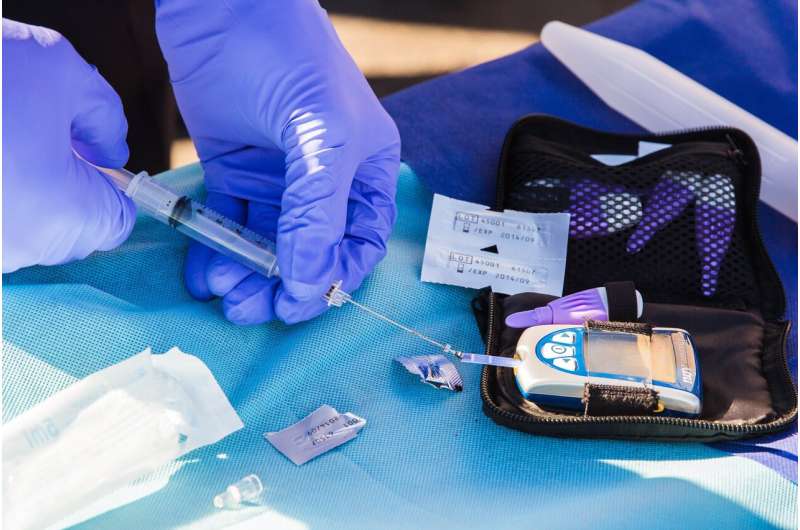Credit: Unsplash/CC0 Public Domain
The largest investigation of testosterone treatment ever undertaken has shown that, over and above the effect of a lifestyle program, treatment with testosterone prevents or reverses newly diagnosed type 2 diabetes in men.
The study, known as T4DM (Testosterone for the prevention of Diabetes Mellitus), was led by the University of Adelaide and involved six specialist centers across Australia.
T4DM was a two-year randomized, double-blind, placebo-controlled clinical trial. The results are published online today in The Lancet Diabetes & Endocrinology.
The T4DM study included more than 1000 men aged between 50 and 74 years old who were overweight or obese. All men were enrolled in the WW (formerly known as Weight Watchers) lifestyle program. They could attend groups, use the website, the app, or any combination of those. Half of the men were injected with long-acting testosterone every three months and the other half were injected with placebo.
After two years of treatment, 87 out of 413 (21%) men in the placebo group had type 2 diabetes (based on an oral glucose tolerance test) compared with 55 out of 443 (12%) men in the testosterone group.
Men in both groups lost weight (on average 3 to 4kg) and glucose tolerance normalized in 43% and 52% of men in the placebo and testosterone groups, respectively.
Other findings at two years in men treated with testosterone compared to placebo:
- A lower fasting blood sugar
- A greater decrease in body fat
- An increase in skeletal muscle mass and hand grip strength
- Improvements in sexual function
- There were no differences in wellbeing or quality of life.
The most common adverse effect occurring in 22% of men treated with testosterone was an increase in the concentration of red cells in the blood, which could potentially lead to "sludgy" blood.
Lead researcher Professor Gary Wittert, director of the Freemason's Center for Male Health and Wellbeing, University of Adelaide, said: "The results of the study show that, on top of modest weight loss achieved with healthy eating and increased activity, testosterone has some added benefit to prevent or reverse newly diagnosed type 2 diabetes.
"However, the results do not necessarily mean that a script for testosterone should be written. We know that men at risk of type 2 diabetes are usually overweight and either have, or are at risk of, other chronic disorders that have not been detected or adequately managed. Not infrequently these men are also drinking too much alcohol and have sleep or mood disorders. Weight loss achieved through healthy lifestyle behaviors remains the benchmark."
More research is needed to determine whether the beneficial effects of testosterone persist beyond two years, whether longer term treatment is safe and whether other forms of testosterone have similar benefits or risks.
"Writing a prescription might be quick and easy but it does not replace the need for undertaking a comprehensive assessment and providing holistic management towards improving men's health," Professor Wittert said.
Professor Bu Yeap from the University of Western Australia's Medical School, and president of the Endocrine Society of Australia, who was an investigator on the study, said: "This is a landmark study which will prompt renewed interest in preventing diabetes in at-risk men."
More information: Gary Wittert, et al. Testosterone treatment to prevent or revert type 2 diabetes in men enrolled in a lifestyle programme (T4DM): a randomised, double-blind, placebo-controlled, 2-year, phase 3b trial. The Lancet Diabetes & Endocrinology 2020. doi.org/10.1016/S2213-8587(20)30367-3
Journal information: The Lancet Diabetes & Endocrinology
Provided by University of Adelaide





















